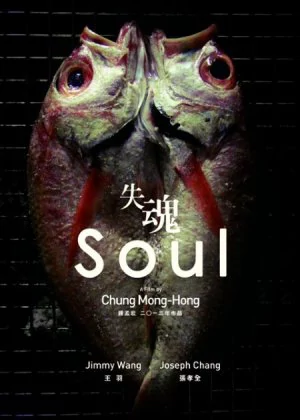Soul

It was only three years ago that Taiwanese cinema suddenly exploded, sadly this new generation of filmmakers has had a rough time confirming their new-found status. Mong-Hong Chung is doing his best to keep the buzz alive though and with Soul [Shi Hun] he delivers another sprawling example of first-rate Taiwanese cinema. It's not the most accessible of films, but you'd be doing yourself a great disservice for not giving Soul a shot.
![screen capture of Soul [Shi Hun]](/thumbs/img/articles/1200xauto/shi-hun-1.webp)
While Mong-Hong Chung's The Fourth Portrait was a perfect example of Asian arthouse drama, Soul throws some different genre elements in the mix. The film bears all the usual traits (or defects if you don't like that kind of thing) of stilted Asian drama cinema, but the story is one that involves murder and intrigue, royally borrowing influences from the thriller genre. An odd mix for sure but definitely one that helps to set this film apart from a million others.
It takes a while to get a firm grip on what the hell is going on though. Chung doesn't fully conform to established genre elements so it's difficult to try and predict where the film is headed. The first murder comes as a complete shock and Chung's cold-hearted effectiveness in showing it is nothing less than staggering. One moment you're looking at an idyllic rural scene, the next cut blood is everywhere. Chung's strength is that he manages to keep this tension going throughout the entire length of the film.
The film follows Ah-Chuan, a kid who traded in his mountain home to work as a cook in the big city. When he simply falls to the floor one day, his co-workers take him back to his hometown where his father and sister have vowed to take care of him. Ah-Chuan hardly interacts with his family, but after a day or two he wakes up from his detached state. Only Ah-Chuan doesn't seem to recognize his family and acts as if he is a completely different person.
![screen capture of Soul [Shi Hun]](/thumbs/img/articles/1200xauto/shi-hun-2.webp)
After watching The Fourth Portrait I don't think there was anyone left who still doubted Chung's visual prowess, but Soul is, if at all possible, even more stunning. It's without a doubt the most beautiful film I've seen all year. And it's not just the lighting or the delicate framing, it's the whole package that amazes. From the unique editing rhythm, the impeccable lighting and the original camera angles to the sublime use of color and excellent use of surroundings, Chung fires landmark shot after landmark shot at the viewer.
The soundtrack alternates between slightly enhanced ambient soundscapes and grim, tense-sounding music. It's a more than solid soundtrack that doesn't necessarily surprise, but does enhance the overall mood of the film. In combination with the editing it makes for some chilling scenes that don't miss their effect. In other words, it's a thriller soundtrack done right.
Chung works with a very limited cast, but he made sure to include some interesting names. Hsiao-chuan Chang should look familiar to fans of Leste Chen's Eternal Summer, but it's Yu Wang who makes the best impression. An old veteran who earned his stripes in the early 70s as a Shaw Bros actor/director, Wang portrays his character with such cold determination that simply seeing him strut around the mountain while tending to his orchids is frightening in itself. Leon Dai, probably the most well-known name, makes a short appearance later on, though his role remains limited to just a couple of scenes.
![screen capture of Soul [Shi Hun]](/thumbs/img/articles/1200xauto/shi-hun-3.webp)
Even though the film doesn't stray too far from typical thriller tropes, the presentation makes sure that you're never quite certain what to expect. The characters are icy and distant, the twists abrupt and razor sharp. And all the while Chung keeps serving the most beautiful imagery, making for a spectacular contrast. While the slow pacing and primal characters might not be to everyone's liking, arthouse enthusiasts shouldn't have too much trouble getting through this film.
Mong-Hong Chung clearly outgrew his image of upcoming talent. His direction is so purposeful and to the point that it almost feels as if he's a veteran already. Soul is pretty much perfect, though it might not be very accessible to those who fail to appreciate the mix of arthouse and genre film ideologies on display here. Apart from some slight pacing issues in the middle and one or two redundant scenes near the end, there isn't anything I can fault. Without a doubt one of the best films I've seen all year.